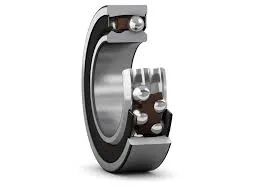
Dec . 23, 2024 07:57 Back to list
ceramic deep groove ball bearings
Exploring Ceramic Deep Groove Ball Bearings Revolutionizing Precision Engineering
In the world of precision engineering, the significance of bearings cannot be overstated. They play a pivotal role in countless applications, from industrial machinery to consumer electronics. Among the various types of bearings, ceramic deep groove ball bearings have emerged as a game-changer, offering a combination of high performance, durability, and reliability. This article delves into the unique characteristics, advantages, and applications of ceramic deep groove ball bearings, highlighting their role in revolutionizing modern engineering.
Understanding Deep Groove Ball Bearings
Deep groove ball bearings are one of the most common types of rolling-element bearings. They consist of an inner ring, an outer ring, balls, and a cage to separate the balls. The design allows for both radial and axial loads, making them versatile for numerous applications. Traditional deep groove ball bearings are usually made of steel, but the advent of ceramic materials has opened new horizons in performance.
What Are Ceramic Deep Groove Ball Bearings?
Ceramic deep groove ball bearings incorporate ceramic balls, typically made from materials such as silicon nitride or zirconium dioxide. These materials exhibit advantageous properties compared to traditional steel, including lower density, higher hardness, and superior resistance to wear and corrosion. The outer and inner rings can still be made from steel or may also be manufactured from ceramic materials, depending on the application and desired characteristics.
Advantages of Ceramic Deep Groove Ball Bearings
1. Enhanced Durability Ceramic materials resist wear and possess greater hardness than steel, leading to a prolonged service life. This characteristic is particularly beneficial in harsh environments where regular steel bearings may fail prematurely.
2. Reduced Friction Ceramic balls produce lower friction than their steel counterparts. This reduction leads to improved efficiency, lower heat generation, and ultimately extends the bearing's life while lowering energy costs.
ceramic deep groove ball bearings

3. Corrosion Resistance Ceramic materials are inherently resistant to corrosion and oxidation, making these bearings ideal for use in wet or chemically aggressive environments. Industries such as food processing, pharmaceuticals, and marine applications greatly benefit from this property.
4. Lightweight Design Ceramic materials are significantly lighter than steel, which enhances the performance of machinery by reducing overall weight. This advantage is crucial in applications where weight savings are vital, such as in aerospace or automotive engineering.
5. High Temperature Tolerance Ceramic bearings can withstand higher temperatures compared to steel bearings. This property allows for their use in high-speed applications or in environments where excessive heat is generated.
6. Low Maintenance Requirements Due to their robustness and resistance to wear, ceramic deep groove ball bearings often require less maintenance than traditional bearings, leading to lower operational costs and reduced downtime.
Applications of Ceramic Deep Groove Ball Bearings
Ceramic deep groove ball bearings are utilized across a range of industries due to their unique properties. Some common applications include
- Aerospace In aircraft engines and control systems where components are subjected to extreme conditions. - Medical Equipment In surgical instruments and diagnostic machines that require high levels of precision and reliability. - Electronics In electric motors and hard drives, where low friction and heat generation enhance performance. - Automotive In high-performance vehicles, these bearings are used in engines, transmissions, and wheel hubs to improve efficiency and reliability. - Robotics In robotic arms and automated systems, ceramic bearings provide the necessary precision and durability for movement.
Conclusion
Ceramic deep groove ball bearings represent a significant advancement in bearing technology, offering benefits that traditional steel bearings cannot match. Their impressive durability, efficiency, and resistance to harsh environments make them suitable for a wide range of applications across various industries. As advancements in material science continue, we can expect the performance and capabilities of ceramic bearings to further evolve, solidifying their essential role in the future of precision engineering. By integrating ceramic deep groove ball bearings into systems, engineers can achieve higher performance, lower operational costs, and extended equipment lifespans—setting new standards for reliability and efficiency in modern machinery.
Latest news
-
Premium Deep Groove Ball Bearings | High Speed & Reliability
NewsAug.29,2025
-
Durable Scaffolding Clamps - Secure & Reliable Tube Connectors
NewsAug.28,2025
-
Common Failures in Thrust Ball Bearings and Solutions
NewsAug.22,2025
-
How Tapered Roller Bearings Can Take Shock Loads
NewsAug.22,2025
-
Angular Bearings in High-Precision Spindles
NewsAug.22,2025
-
The Impact of Misalignment on Cylindrical Roller Bearing Performance
NewsAug.22,2025
